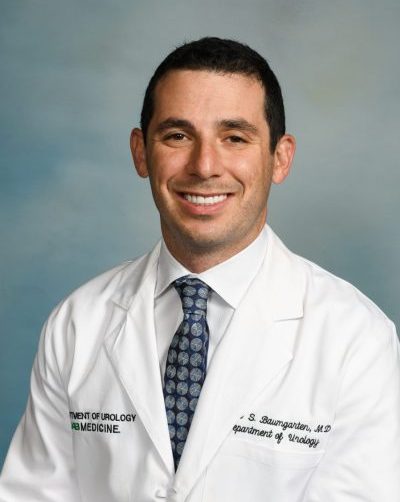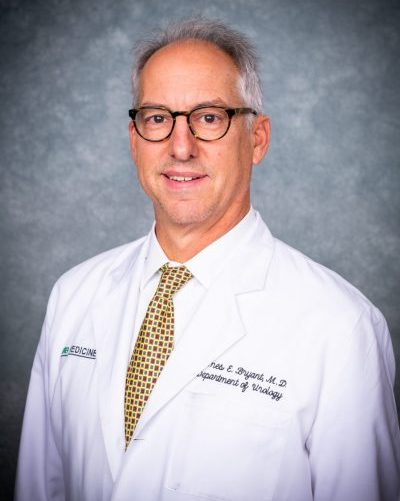Patients
View important updates for patients about the Alabama Supreme Court’s ruling that caused UAB to pause in vitro fertilization (IVF) treatments that involve egg fertilization or embryo development.
UAB Medicine combined many types of men’s health care services to form the Men’s Health Clinic at The Kirklin Clinic of UAB Hospital. It treats some of the most common men’s health conditions, including infertility, incontinence, sexual health issues, and genitourinary (GU) cancer. The clinic is staffed by an experienced team of physicians and surgeons from the UAB Department of Urology, along with nurse practitioners and urology nurses and technicians. Patients receive the most accurate diagnoses and effective treatment options available, including complex genital and urinary reconstruction surgery and treatment of enlarged prostate using minimally invasive laser surgery, which means that no cutting is required.
The range of conditions we treat and the services we provide include:
- Erectile Dysfunction: Also known as impotence, erectile dysfunction (ED) is the inability to achieve erection, an inability to consistently achieve an erection, or the ability to sustain only a brief erection. 80-90% of ED cases are caused by physical problems, usually related to the blood supply to the penis. Treatments vary but can include medication, hormone replacement therapy, and penile implants or pumps.
- Penile Implant: A penile implant, or penile prosthesis, is a surgically implanted device used to treat erectile dysfunction (ED). When medications, vacuum pumps, or injection medications do not provide a satisfactory erection, surgical treatments often can correct ED. Erectile dysfunction that requires surgery is sometimes seen in men with diabetes, vascular disease, and in men who suffered trauma or had surgery or radiation treatment for prostate cancer or other cancers. Penile implant surgery often is covered by insurance.
- Male Infertility: Infertility is defined as the inability of a man and a woman to conceive a child after one year of unprotected intercourse, and it affects 10-15% of couples. As many as one-third of infertile couples are infertile due to male factors alone, and male factors contribute to the problem in about half of all cases. Male infertility can be treated with surgery, medication, and/or lifestyle changes. If the problem is not treatable or correctable, a couple may be able to get pregnant with intrauterine insemination (IUI) or in vitro fertilization (IVF). Male infertility should not be confused with erectile dysfunction (ED), which is the inability to get or keep an erection long enough for sex and usually is treatable.
- Peyronie’s disease: Peyronie’s disease is caused by scar tissue inside the penis, resulting in a bent rather than straight penis when erect. Most men with this condition can still have sex, but it can be painful and cause erectile dysfunction (ED) or shortening of the penis in some cases. Peyronie’s disease rarely gets better on its own. For men with a slight curve that isn’t getting worse and who have good erectile function, treatment usually is not required. However, if the curve is severe or interferes with sexual activity, treatment may help. Treatment options include surgical procedures and Xiaflex (collagenase clostridium histolyticum) injections.
- Prostate Cancer Screening: UAB was the first medical center in Alabama and among the first in the southeast to offer the latest advancement in prostate cancer detection, which combines magnetic resonance imaging (MRI) and ultrasound (US) technologies and provides significant advantages over traditional methods. The MRI/US Fusion-Guided Prostate Biopsy technique enables your physician to detect prostate cancer earlier and more easily than with conventional biopsy alone.
- Urinary Incontinence: Urinary incontinence is a loss of bladder control, which is a common condition that can develop at any age, though it tends to occur more often later in life. Although it can be embarrassing, it is highly treatable and is not a normal part of the aging process. Symptoms range from mild leaking to uncontrollable wetting.
- Vasectomy: A vasectomy is a form of permanent male contraception in which a surgical procedure is performed to block sperm from reaching the semen. The man still ejaculates semen from the penis and continues to produce sperm after a vasectomy, but the semen has no sperm in it. This currently is the only approved method of male contraception, although birth control medications for males are being tested. Recovery takes about one week.
- Vasectomy Reversal: Of the roughly 500,000 vasectomies performed annually in the United States, about 4-10% of men request a vasectomy reversal. Most men seeking information about a vasectomy reversal are in a new relationship and are interested in having children with this new partner. Other men, after having a vasectomy, decide that they want more children. The chance for pregnancy depends on several factors, including the amount of time since the vasectomy, the skill of the surgeon and the techniques used, and any female fertility issues that may be present in the partner.
The UAB Department of Urology specializes in the diagnosis and treatment of diseases and disorders of the genitourinary tract, which includes both the urinary and reproductive systems. U.S. News & World Report consistently ranks UAB’s urology program among the top 50 of its kind in the nation, and we regularly receive patient referrals from other hospitals in Alabama and surrounding states. Many of our physicians and surgeons helped write national guidelines on treating men’s health conditions, and they share this expertise by speaking at national and international meetings.
Most of our doctors have completed fellowships in addition to traditional urology training, including advanced training in genitourinary cancer, kidney stone disease, and male infertility. UAB Urology specialists are members of the American Board of Urology, the American Urological Association, the American Society for Reproductive Medicine, the Society for the Study of Male Reproduction, the Society for Male Reproduction and Urology, the Society of Urologic Oncology, and the American Medical Association, among others.
Care Providers
Videos

Resources
Related Specialties
- Computed Tomography (CT Scan)
- Erectile Dysfunction
- Male Infertility
- Program for Personalized Prostate Cancer Care
- Urinary Incontinence (Male)
- Vasectomy Reversal
- Women & Infants Services
Clinical Trials
Speak to your physician about your options and browse the link below for more information
Latest News
View All News-
Uncovering the connection between obesity and kidney stone disease
July 8, 2025
-
Understanding the signs, causes and treatment options for low testosterone
June 24, 2025
-
UAB to now offer aquablation therapy for benign prostatic hyperplasia
May 16, 2025
-
Tips to lower risk of kidney stones
April 14, 2025
-
UAB named OHF Care Center for excellence in rare kidney stone disease research and clinical care
January 13, 2025







